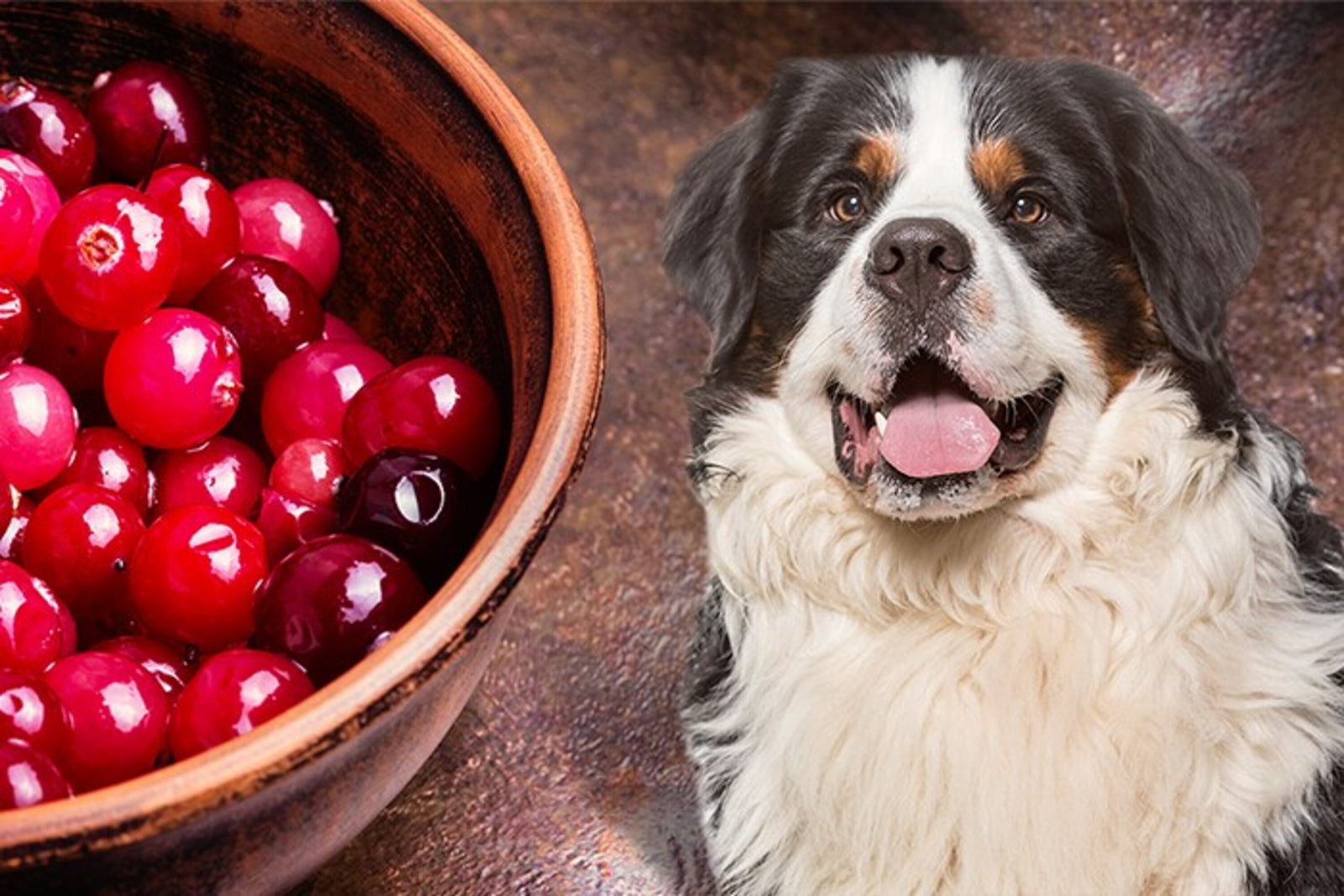What is the first thing that comes to mind when you think about cranberries - juice, sauce, jams, or craisins? You probably prefer cranberries in one form or another. And while you may savor this sour fruit, you might wonder if you can share it with your furry friend.
The good news is that fresh cranberries can be safe and healthy for your dogs if served in moderation. But there are a few things that you’ll have to take into account before feeding cranberries to your dog. We’ll discuss all these concerns in this article, but first, let’s understand the benefits of cranberries for a dog.
Benefits of Cranberries for a Dog
Cranberries are loaded with many nutrients and vitamins that are known to have multiple health benefits for a dog. To give you an overview, here’s a breakdown of the nutritional content of cranberries:
1. Rich in Antioxidants
Cranberries are powerful antioxidants that can help your dog's body fight free radicals that cause cell oxidation. It aids in the protection of the immune system and improves brain function.
2. Good Source of Vitamins
Cranberries contain vitamin C which can help reduce inflammation and cognitive aging and vitamin E which is good for the immune system and heart health. It also contains vitamin B2 that’s known to support digestion.

3. Provides Essential Minerals
Cranberries contain potassium that aids in muscle strength and growth and manganese that contributes to a healthy metabolism, bone structure, and absorption of calcium. It’s also a rich source of iron which is a very important mineral that helps produce energy by carrying oxygen in the hemoglobin of red blood cells throughout the dog’s body.
4. Contains Dietary Fiber
The fiber content of cranberries can help regulate your dog’s bowel movement and promote a healthy digestive system. Furthermore, dietary fiber can encourage weight loss by making your dog feel full for longer.
But make sure you feed cranberries in moderation and as a supplement. Too much fiber in your dog's diet can lead to nutritional imbalance, constipation, and other health complications.
5. Contains Phytochemicals
The diverse phytochemical profile of cranberries allows it to prevent plaque build-up on a dog’s teeth. It might improve the dental health of your dog by slowing down the production of acid and bacterial growth in their mouth.
6. Antibacterial & Antifungal
Cranberries can help control the growth of many unhealthy bacteria and fungi. For example, it prevents the growth of Helicobacter pylori which can cause ulcers and Pseudomonas aeruginosa which can cause lung infections.
Cranberries for UTIs
Many studies have found that cranberries can prevent UTIs in humans. It contains D-Mannose, a naturally occurring sugar that blocks E. Coli bacteria from sticking to the walls of the bladder, thus preventing UTIs.
People often believe that since cranberries prevent UTIs in humans, they’ll have the same effect in dogs. But in reality, there aren’t enough studies that can prove this theory. Hence you can feed cranberries to your dog but that doesn't guarantee that they will not get a UTI.
Besides, there are multiple reasons why your dog can get UTIs. In some cases, it can be due to an underlying cause like kidney disease, bladder stones, stress, and other neurologic diseases. Thus it’s important that you consult a veterinarian and provide proper medical treatment to your dog instead of relying on supplements to treat or prevent UTIs.

How to Feed Cranberries to Your Dog
Fresh cranberries are a healthy choice for your dog. But since it has a sour and sometimes bitter taste, many dogs will often turn their noses. There are many other forms and food options available that include cranberries, but let’s find out which one of these is safe for a dog.
1. Frozen Cranberries
Frozen cranberries can be a great treat for your dog on a hot summer day. But make sure you slice it into small pieces to prevent choking.

2. Cranberry Sauce
We enjoy our Thanksgiving and Christmas dinner with turkey and some cranberry sauce. But can dogs eat cranberry sauce? It depends on how the sauce is prepared. The ones we have at our dinner tables often contain additional ingredients including raisins and sugar which are harmful to a dog.
It can cause gastrointestinal upset, diabetes, and obesity. Some recipes even use alcohol which is also toxic for dogs. You’ll have to be extremely cautious about these products. Even the “sugar-free” canned cranberry sauce contains xylitol, an artificial sweetener that is also highly toxic to dogs.
If you wish to feed cranberry sauce to your dog, it’s best that you prepare it at home by boiling some cranberries without adding any sugar or flavorings.

3. Dried Cranberries
Dried cranberries are safe for dogs as long as they don’t contain any added sugar. These are more concentrated than fresh cranberries as the moisture is removed. Hence it’ll have the same nutritional value.
Many times dried cranberries come as a part of a trail mix that also contains raisins which are toxic for dogs. You should buy dried cranberries that do not contain any other additional ingredients.

4. Cranberry Juice
Similar to cranberry sauce, cranberry juice also contains high amounts of sugar, grapes, and other ingredients. These can be harmful to your dogs. Yet many pet owners want to feed cranberry juice to their dogs as they believe it’ll help prevent UTIs. In this case, you can buy unsweetened cranberry juice that doesn’t contain any artificial sweeteners and preservatives.
You can also make cranberry juice at home by boiling fresh cranberries in a large pan until the berries burst. Then you can simply strain the juice through a fine strainer lined with a cloth. Without any added sugar or flavors, the taste might not appeal to a dog, you can try to freeze the juice in ice trays and serve it as a frozen treat.

5. Cranberry Supplements
If you don’t prefer feeding cranberries directly to your pooch, you can always buy supplements. Many pet brands make dog treats and toppers that contain cranberries. But do not feed the supplements made for humans to your dog without consulting your veterinarian.
Cranberries for Puppies
Puppies can eat cranberries just like an adult dog. You’ll have to follow the same specifications and feed them only fresh, frozen, or dried cranberries that do not contain any added sugar. Avoid feeding any cranberry sauce as it contains other toxic ingredients.

The ideal amount of cranberries you should feed your puppy will depend on their breed and prior health conditions. But start by feeding them only 1 or 2 cranberries in a day and monitor how they react for the next 24-48 hours. Also, make sure you slice cranberries into small pieces to prevent your puppy from choking.
How Many Cranberries Can You Feed Your Dog?
Cranberries are a supplement to a well-balanced diet and should always be served in moderation. The exact amount of cranberries you can feed your dog will depend on their age, weight, breed, and their health condition.
But ideally, if you have a medium to large dog, you can feed them a few cranberries per day and if you have a smaller dog then stick to one or two cranberries per day. You can always consult your veterinarian to determine the exact amount of cranberries you should add to your dog's diet.
Also, note that many dog food brands add cranberries to their recipe. This is a great option for dogs who dislike the sour taste of the fruit because once cooked cranberries lose their sour profile. But if you’re feeding them store-bought food that contains cranberries, you should refrain from feeding them more cranberries at home.
It’s important that you only feed the right amount of cranberries to your dog. It’s a very acidic fruit that can have adverse effects on your dog's health if eaten in large quantities.
Harmful Effects of Feeding Too Many Cranberries to a Dog
In general, if your dog intakes large amounts of any food item, it can cause an upset stomach, vomiting, or diarrhea. Furthermore, cranberries contain oxalate which is a compound that’s produced as waste by the body. Though it can exit through the urine, too many cranberries can raise the oxalate levels in your dog’s urine. This can create calcium oxalate stones or bladder stones in dogs. It’s a serious health condition that might even require surgery.
Thus it's important that you feed cranberry in moderation and consult your veterinarian to avoid any potential health risks.

Summing Up: Can Dogs Eat Cranberries?
Cranberries have many nutritional benefits that can contribute to the overall health and well-being of a dog. When fed in moderation, it can be a great source of vitamins, minerals, and antioxidants.
Just make sure you’re feeding the right form of cranberries to the dog. Raw, frozen, and dried are the healthiest choices. But you need to avoid canned cranberry sauce and juices that contain additional ingredients like raisins, sugar, grapes, etc. All these ingredients are toxic for a dog and can pose serious health risks.
If you have any further questions, you can consult your veterinarian before adding cranberries to your dog's diet.
FAQs
Let’s answer some frequently asked questions about feeding cranberries to a dog:
1. Can a dog eat raw cranberries?
Yes, you can feed raw cranberries to your dog but they might not like the sour and sometimes bitter taste of this fruit.
2. Can a dog eat fresh cranberries?
Yes, fresh cranberries are a healthy option for your dog if served in moderation.
3. Can a dog eat cranberry sauce?
It depends on how you have prepared the sauce. Most cranberry sauces both homemade and store-bought contain a high amount of sugar and additional ingredients. These are toxic for a dog. Even the “sugar-free” sauce available in the market contains artificial sweeteners like xylitol, which is also harmful to a dog.
If you want to feed cranberry sauce to your dog, you can prepare it at home by boiling some cranberries without adding any sugar or flavorings.
4. Can a dog eat cranberries for UTI?
Cranberries are known to prevent UTIs in humans but there aren’t enough conclusive studies that can prove that cranberries will prevent UTIs in dogs. You can feed your dogs cranberries but there are chances that they’ll contract UTI due to some other reasons.
In some cases, UTI can also be a system of an underlying health condition. Hence it’s important you consult a veterinarian to provide proper medical treatment to your dog.
5. Can I feed cranberries to my puppy?
Yes, you can feed cranberries to your puppy but in moderation. Ideally, you should only feed 1-2 cranberries in a day to get started and make sure you slice them into smaller pieces to avoid choking.
Join Our Pack
Sign up for our monthly newsletter focused on dog digestion health, cute pup stories, and the latest scoop from Nextrition.
Sources:
https://www.thedodo.com/dodowell/can-dogs-eat-cranberries
https://www.masterclass.com/articles/can-dogs-eat-cranberries
https://www.akc.org/expert-advice/nutrition/can-dogs-eat-cranberries/
https://www.pumpkin.care/blog/can-dogs-eat-cranberries/




